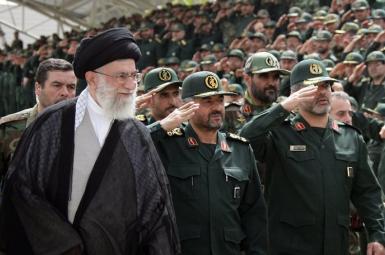
Iran’s Top General Says US Active In Sabotage, Talks Mean Surrender
Major General Mohammad Bagheri, Iran’s highest-ranking military official, has said the United States wants to make Iran capitulate at the negotiating table. The Chief of the Joint Staff of the Iranian armed forces made the statement during a meeting with provincial civil defense officials on Monday October 26.
“The outcome of negotiations with America is known beforehand, and that is surrendering to the United States,” Bagheri said. “But this is not consistent with the Islamic Republic’s strategy.”
Bagheri accused Iran’s “enemies” of doctoring equipment and industrial parts sold to Iran in order to collect intelligence or to sabotage plants where they are used. His suggestion was consistent with claims made by officials about incidents at nuclear facilities, though Iran did not explain the cause of several major blasts at military organizations including garrisons near Tehran during the past year.
Bagheri’s claim apparently flew in the face of Iran’s inability to purchase parts from Western countries although Tehran is known to buy equipment indirectly and through front companies. Bagheri said the “infiltration” usually took place in Iran’s nuclear plants and communication centers, and suggested one of the best counter-strategies was developing domestic technology.
Last year, the New York Times reported secret US operations to sell faulty equipment to Iran for use in its missile and rocket program. The Times suggested such sabotage might help explain a high rate of failure in Iranian tests.
In his remarks, Bagheri emphasized the importance of preparing the civilian population for any disruption. He called for drills at all government bodies. “Every office should have practiced the ways of confronting threats,” he said, expressing the readiness of the armed forces to assist. He further suggested moving dangerous establishments from populated areas so as to avoid anything like the August 4 explosion in Beirut.
Defending Iran’s regional role, Bagheri said, “We live in a part of the world, where we would be defeated if we are not powerful.” He stressed that Iran did not covet the territory of any other country – words that are unlikely to placate the United States, Israel and the Gulf Arab states who have generally opposed Iran’s military presence in Iraq and Syria.
Bagheri argued that US pressure on Iran, in breach of its commitments under the 2015 nuclear agreement, was designed only to make Tehran surrender. On leaving the nuclear deal in 2018 and announcing “the strongest sanctions in history”, Mike Pompeo, the US Secretary of State, unveiled a list of 12 “basic requirements” for Iran including ending all uranium enrichment and plutonium processing; scrapping ballistic missile development; breaking links with regional allies including Hezbollah in Lebanon and militant Palestinian groups; withdrawal of any military presence in Syria; and disarming allied Iraqi militia.
Bagheri opined that Iran’s enemies were unlikely to launch a military attack, but would resort to chemical, biological and radiological and cyber assaults. In a strange statement he suggested the Covid-19 pandemic was probably a biological attack.
Bagheri’s statement came less than a week after John Ratcliffe, the US Director of National Intelligence, suggested Iran had carried out cyber activities aimed at US voters in the presidential election of November 3.








